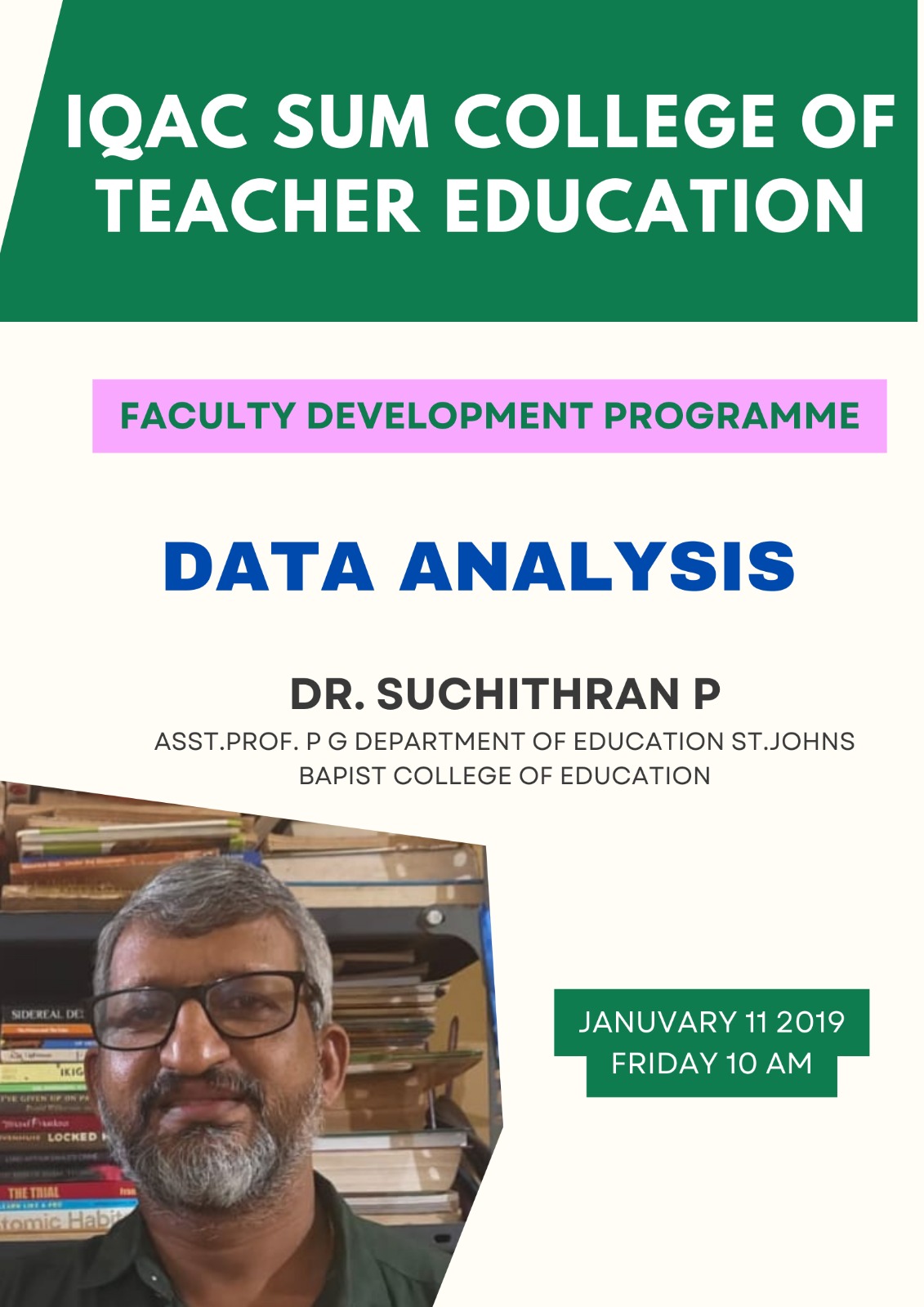1. Introduction
The Data Analysis Faculty Development Program, led by Dr. Suchithran, was held on January 11, 2019, at SUM College. This program aimed to enhance the data analysis skills of the faculty members, equipping them with the necessary tools and knowledge to incorporate data-driven decision-making into their academic and administrative functions.
2. Objectives
The primary objectives of the program were to:
- Improve faculty members’ understanding of data analysis techniques.
- Introduce modern tools and software for effective data management.
- Demonstrate practical applications of data analysis in academic research and teaching.
- Foster a culture of data-informed decision-making within the institution.
3. Program Overview
a. Session 1: Introduction to Data Analysis
- Time: 9:00 AM – 10:30 AM
- Content: Dr. Suchithran provided a comprehensive overview of data analysis, including its significance in academic research and institutional decision-making. Key concepts such as data types, data collection methods, and basic statistical techniques were covered.
b. Session 2: Tools and Software for Data Analysis
- Time: 10:45 AM – 12:15 PM
- Content: Participants were introduced to various data analysis tools and software, including Excel, SPSS, and R. Dr. Suchithran demonstrated how to use these tools for data visualization, statistical analysis, and interpretation of results.
c. Lunch Break
- Time: 12:15 PM – 1:00 PM
d. Session 3: Practical Applications and Case Studies
- Time: 1:00 PM – 2:30 PM
- Content: This session focused on practical applications of data analysis. Dr. Suchithran presented several case studies relevant to academic settings, highlighting how data analysis can address common challenges and improve research outcomes.
e. Session 4: Hands-on Workshop
- Time: 2:45 PM – 4:15 PM
- Content: Participants engaged in a hands-on workshop where they applied the concepts and tools discussed earlier. This interactive session allowed faculty members to work on real datasets and practice data analysis techniques with guidance from Dr. Suchithran.
4. Key Takeaways
- Enhanced Skills: Faculty members gained practical knowledge in using data analysis tools and techniques, which will contribute to more effective research and teaching practices.
- Increased Awareness: The program heightened awareness of the importance of data-driven decision-making in academic settings.
- Practical Experience: The hands-on workshop provided valuable experience in applying data analysis methods to real-world scenarios.
5. Participant Feedback
Feedback from participants was overwhelmingly positive. Key points from the feedback included:
- Content Relevance: Participants appreciated the relevance of the content and the practical applications discussed.
- Facilitator Expertise: Dr. Suchithran’s expertise and clear explanations were highly valued.
- Workshop Effectiveness: The hands-on nature of the workshop was seen as particularly beneficial for reinforcing learning.
6. Recommendations
Based on the feedback and observations, the following recommendations are proposed:
- Follow-Up Sessions: Organize follow-up sessions to address advanced topics and provide ongoing support.
- Resource Sharing: Develop a repository of resources and tools introduced during the program for future reference.
- Feedback Mechanism: Implement a mechanism for ongoing feedback to continuously improve faculty development programs.
7. Conclusion
The Data Analysis Faculty Development Program conducted by Dr. Suchithran was a successful initiative that significantly enhanced the data analysis capabilities of SUM College’s faculty members. The program achieved its objectives and provided participants with valuable skills and knowledge that will benefit their academic and research activities.

